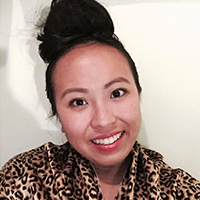
Linda Bui
Specialist: International Development Studies Co-op (Arts)
What factors contributed to you choosing your program(s)?
When my senior year of high school rolled around, I began researching University programs online. I didn’t have any exact ideas on a specific future profession I wanted to work towards, but I did have a sense of what I hoped to gain from my prospective program. Since I was an active volunteer in my community focused on social justice issues, I also wanted my program to reflect the values instilled in me. I also had a range of interests from environment, healthcare, and politics, so I also wanted to be able to explore these areas. When I first came across a description for international development studies (IDS), I knew immediately this was the program for me: It is interdisciplinary, challenging and collaborative. To me, what set the IDS program at UTSC apart from other IDS programs was the long-term and hands-on co-op opportunity for students in their fourth year. I knew gaining work and practical experience, concurrently with studies, to bring program theory into practice, would allow me to test out my interests, network with potential future employers, and build my professional portfolio.
Can you describe your program(s)? What is it actually like?
I’m currently abroad in Sri Lanka completing a 11 month co-op placement.
Those in the IDS program often call it an ‘IDS Bubble,’ not because students are exclusive, but the IDS community is quite small with many collaborative opportunities. Prior to University, one of the biggest myths I was told is that as a post-secondary student, you’ll be seen as just a number. This has not been the case as the majority of my Professors have come to remember my name, and most have open-door policies for office hours to answer questions. Being in the IDS program also means you’ll run into a familiar face on campus, perhaps collaborate alongside others on a student club, hangout at (the best) potlucks, chat them up in the dedicated IDS study lounge, and (specifically for co-op students) have a weekend retreat getaway to learn firsthand everything placement related from senior students. In terms of the coursework, the program is rigorous with mandatory courses in economics, politics, environmental science, methodology, and preparatory courses for co-op students; expect to have approximately 2-3 articles or chapter readings each week per course. What I have gained most through my coursework are greater critical thinking and writing skills - expect to write about 10 essays each year! The culmination of my studies, I know, will pay off in the long run. A major task for co-op students is completing a senior thesis paper with collected data during their co-op placement. This is not only a unique opportunity to work closely with a Professor, who acts as a supervisor, and to gain research skills, but also a means of putting together the past few years of studies into a tangible project which also has potential to be being published in a journal article.
What tips/advice can you provide to students just starting or considering this program(s)?
- Meet people from outside the IDS Bubble! It can be comforting to stick with people you’ve met in the program, but there are others to connect with too! There are many campus clubs, sport leagues (including beginner and non-competitive in Athletics), and non-IDS courses (including at other UofT campuses) to join to meet people. Keep in mind that you can “credit/no credit” up to two credits worth of courses - which means final grades don’t show up on your transcript. So, you can test out non-IDS courses with this “credit/no credit” option, which eases the burden and stress of maintaining your GPA for unfamiliar courses. It’s also a great way to learn more about other disciplines and the interesting people in those studies - yourself included for them. Some of my most cherished friendships are with people outside my program.
- Ask questions. As cheesy as this one is, do it - especially in class. Don’t be shy to raise your hand and ask something. If you participate in class, the likelihood of retaining concepts for future midterms or finals sky rockets. Take this to the next level by challenging yourself to attend at least one office hour with Profs or TAs (teaching assistants), or emailing them if you can’t make it in-person, for each of your classes. This small gesture goes a long way with building rapport with your instructors and learning how to tailor your writing, assignments, etc. to your best for each course. As well, each program has a course advisor who you can speak with regarding your degree and courses. A tip I have is that you can advocate for certain courses to be applied to your degree requirements, if they fulfill the minimum criteria - the IDS course calendar is a guide and not written in stone! For instance, I was able to apply a Health Studies course to my gender, health and development cluster as themes covered were relevant to this area.
- Finally, set up a self-care routine for yourself. Not only when it comes to the most stressful times during the semester, but plan out things you can do for yourself throughout the year that you continue during high-stress times. Get enough hours of sleep, seeing a counsellor, schedule time to socialize or to do a genuinely fun and relaxing activity to you, stay hydrated and make sure to eat proper meals. The earlier you set up a routine that works for you, the easier it is to manage stress down the road. For me, I’ve made time to play in an ultimate frisbee league every week, eating homemade meals every day, volunteering with a girls group in my community, and allowing myself a much needed nap on my commute rides home. Your wellbeing is more important than one grade or course - remember that on high-stress days.
What will you do with your degree after graduation? (Future plans?)
International Development Studies is a highly multi-disciplinary field with vast opportunities to work in government, civil society, journalism, non-profits, and in regional level as well as cross-border contexts. I am very open minded to my post-graduation plans. I’ll look into some graduate schools and Masters programs; if there are ones that I am deeply passionate about, I will apply before graduating. If not this, I hope secure work with a social justice organization in Canada or abroad working in one of my areas of interest - environment, healthcare, and/or gender equality most likely and consider graduate studies down the road. I don’t see myself settling forever with a 9-5 office job or sticking with one role for the next 25 years; I see myself taking on various projects and wearing many hats. One day I hope to become an autonomous consultant who may contribute to each initiative that comes my way with great excitement, attention and care.
What has your academic journey during your time been like as you progress toward graduation?
IDS first year is about building the foundations in theories of development and entails taking a couple of mandatory introductory courses including Introduction to IDS, Environmental Science, and two courses in economics, and other courses of your choice, although many students take other core IDS courses. Students also take a non-credit co-op preparatory course called Passport to Placement, which focuses on writing resumes, cover letters, interviews, networking, etc. Second year is about completing core courses in IDS and beginning to fulfill specialized courses or approaches to IDS requirements in which students must decide on. If those specializing in IDS decide to Major or Minor in other areas, they may fulfill those degree requirements and often choose IDS specialized courses that complement their Major/Minors. By the end of second year, many students choose to complete their 1 full credit in a second language course requirement, either through summer programs after first or second year (e.g. the Explore Language Bursary program, summer abroad programs or courses at the downtown campus) or having taken language courses at UTSC during the year. It is highly advised that students complete their language requirement prior to going off on placement. In the third year of IDS, most students focus their courses to their specific interests, and complete IDS methodology courses including ones in Project Management and the mandatory “Research Design for Development Fieldwork Course” and ones for their qualitative and quantitative method requirements. Another non-credit preparatory course is mandatory which is focused on the logistics of placement including health and safety, research for senior thesis and applying to placements opportunities. In the fourth year, students are completing their co-op placement which lasts between 8-12 months. While on placement, students are expected to draft their research proposal for ethics approval. After gaining approval from U of T, students undertake primary data collection, which will be used towards their senior thesis course in fifth year. While on placement, students are also expected to complete bi-monthly reports to the IDS co-op coordinator, be in communication with their research thesis supervisor and manage their work role. In fifth year, students finish the remainder of their degree requirements including the major post-placement seminar and thesis course and upper year level (C and D) level courses.
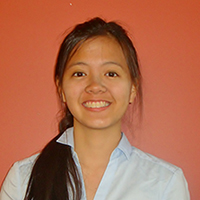
Ting-Yi Chang
Specialist: International Development Studies Co-op (Arts)
Major: Economics of Management Studies
Minor: Media Studies
What factors contributed to you choosing your program(s)?
I chose the co-op specialist program of International Development Studies (IDS) at UTSC because it offers students the opportunity to complete an 8-12 month work placement overseas in a Global South country. For me, it is not even a rare chance in a lifetime but also a fantastic learning opportunity to combine theoretical knowledge in the books to actual actions and experience on the ground. I am currently completing my 11 month placement in India and I can testify that it is indeed an exciting, self-exploring, and extremely valuable learning experience. On the other hand, I chose to add a major in Economics after the completion of my first year in IDS. While many Arts students consider taking Economics courses in the mathematical approach (instead of theoretical) is a heavy burden, I see it as a great blessing to advance my logical thinking and quantitative data analysis skills, alongside with the qualitative, anthropological focus that the IDS community emphasizes. In my opinion, it is an important balance to find. To make the combination even more colourful, I also chose Media Studies as my minor since I have always been fascinated by the media theories how they shape our society and reality. It was not until later that I realised this minor helps me see IDS issues like "free knowledge and development", "information and technology for development", and "the portrait of an Global South image" with a totally new lens.
Can you describe your program(s)? What is it actually like?
(I am focusing on the IDS Specialist co-op program in this question) IDS co-op program is a really close-knit community, or more accurately, family. In the IDS co-op program, we are not only classmates who sit together in lectures, but also friends who help each other through the challenging placement preparation, and sisters and brothers who you Skype and share your struggles and laughters with when we are all in different places. Faculty members in the program are also extremely supportive and multi-disciplinary. That's a great thing about being an IDS student - no matter what your passion is, usually there will be a way to link it to development and most possibly there is a faculty member who can be your best friend and tutor on your journey to explore all possibilities. The curriculum of IDS co-op can be quite theoretical in the first two years in my opinion, but it will definitely enrich you with the necessary critical thinking skills, broad knowledge, and creativity that will eventually become part of you.
What tips/advice can you provide to students just starting or considering this program(s)?
- If you are an IDS (co-op) student, I strongly recommend that you explore your passion and field of interest in development as early as possible. The broadness of development studies can be a blessing but a weakness at the same time. It is best to find a direction that you are most interested in about development (ex. Environment and development, political conflicts in development, development history in Canada's First Nations, anything!). Thinking about this early also helped me plan out my courses in the four years well in advance so that I am not stressed about missing credits or delaying my graduation when there are three programs on my plate.
- Although IDS co-op program (or even exchange programs at UofT) provide the chance for you to go abroad, you don't need to be abroad to make your university life colourful and meaningful. Before my placement in India, I tried volunteering for child literacy, helping out a mental health awareness project, organizing a conference for my program, and even playing Quidditch! There are so many things to do on campus (all three campuses if you want more!). Each of these experiences contributes to my well-being, interpersonal skills, and shapes whom I am today. I would not be able to do what I am doing today without all the learning and training in each of these activities. I guess what I am saying is, have fun, meet people, and discover hobbies in your university years!
What will you do with your degree after graduation? (Future plans?)
With my interest in the media aspect of development and my current work placement that focuses on the internet and social issues in India, I think I will consider a post graduate degree in information, internet study, or something related. Many people think that graduating from a development studies program means working in an NGO or the government as a social worker for a lifetime, but that is far from the truth. There is so much to explore during your 5 (or 4) years in the program and every year people discover routes that no one has tried before. I will say, no matter if my future career or study will be development-related or not, this program has taught me many valuable lessons and skills that I can always apply to different fields.
What has your academic journey during your time been like as you progress toward graduation?
In first year I tried to complete most of my breadth requirement credits and it was through this year that I found my passion in Media Studies (which later became my minor) and also decided to take on Economics as my major outside of IDS co-op Specialist. For me, first year courses are generally not difficult even though the hours spent on classes may be more than what you will get in the following years. I also used my first year to try out many interesting student clubs and extracurricular activities. As an international student who came to Canada all alone, I found this really helpful in building my confidence in socializing with people. Second year curriculum is honestly not too hard either but some more efforts and time are definitely needed. I think the biggest trap is that after first year I thought that I knew how to juggle between courses and social life, but soon it was clear that nothing is as easy as it seems. This was also the year that I started taking up more leadership positions in my extracurricular activities and even a part time job. I learned it the hard way to say "No" to some extra responsibilities, as well as, to not compare myself with my peers to stress myself out - after all, we are all going towards different directions (this will become even more clear in third year). During the summers (in 1st and 2nd year) and in my second year I also took courses downtown for Economics and French. There are so many rumours that the courses offered in the downtown campus are much harder, which I'd say is just a myth. If you think it is hard, it would seem hard anyway. If you just try your best, there's not much difference in the mark you'll get or in the performance of students between the two campuses. In my third year classes became a lot smaller and the topic more narrow and practical. In my opinion, it is the best because you can focus on the topics you are passionate about and become close friends with the professors. Third year is also a crucial time for IDS co-op students to apply for jobs overseas. I was lucky enough to have set up my mind and built a network with my soon-to-be research supervisor quite early, so the application process was pretty smooth for me but the situation can differ from person to person. Right now, I am in my fourth year in India, I am not taking any courses but am preparing for my thesis in the fifth year. One year overseas sounds (and IS) fascinating but at the same time I learned that I have to be more self-motivated when there's no hard deadline or assignments to push me. At this moment, I am collecting data for my chosen research topic and will be writing my thesis on it once I come back for my fifth year.
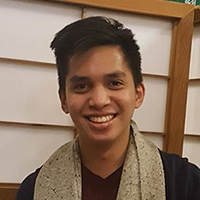
Patrick Lloret
Specialist: International Development Studies Co-op
Minor: Political Science
What factors contributed to you choosing your program(s)?
Growing up in the Philippines, I have seen different people face challenges that are very different from what we have in Canada. I have seen how people continue to live in poverty, and I started to volunteer and help these people. After high school, I realized that there are many people working to try and help and potentially improve the world that we live in. After moving to Canada, and looking to find university programs, I found the International Development Studies co-op program. I chose this program because I wanted to be part of a broad multidisciplinary community, and understand the systems in the world we live in, hoping to create a positive change. What set this program apart from others is that it offers me a broad and in-depth understanding of international development, and a year long co-op placement with an international organization, anywhere around the world.
Can you describe your program(s)? What is it actually like?
Being a part of this rigorous program has taught me immense analytical and critical thinking skills, which I have applied in my different research projects, theses, and field work. The highlights of the program are the year 8-12 month co-op placement abroad, and the completion of an undergraduate thesis. With the help of the university, I have successfully gained and completed a 9 month work placement in Vietnam, with the World University Service of Canada (WUSC), as a Sector Research and Analysis Officer. Aside from my work in Vietnam, I have also conducted primary research, which I needed to complete my final undergraduate thesis. Being a small program, I was able to easily establish networks with my professors and other professionals who continue to help me achieve my academic and career goals.
What tips/advice can you provide to students just starting or considering this program(s)?
- Volunteer experience counts. As early as your first year, gain plenty of volunteer as well as work experiences, as these make a difference on your resume, and will help you gain the skills that you need to be successful. Having volunteer experiences in different fields will open doors for you to either work or volunteer in any field that you choose. UTSC also offers different volunteer or career fairs throughout the year, and the Academics Advising & Career Centre is always there to help you with writing your cover letter and resume.
- Network. UTSC constantly offers numerous networking opportunities by holding events, seminars, and workshops for students. These events aren't just meant for students to learn new things, but also to engage with different professionals, and to gain other perspectives that supplement what you learn in your different courses. The Centre for Critical Development Studies (CCDS), and International Development Studies Students Association (IDSSA) constantly hold seminars and events where students can engage with their professors as well as guest speakers.
- Do your readings! What I have found to be particularly interesting in all courses is that the perspectives, and material that are studied have always been relevant in understanding the world around us. The analytical lenses, readings, and theories we learn in our course material are often very relevant to current affairs, and will often guide you in your future careers.
What will you do with your degree after graduation?
I think that my co-op experience prepared me for work after graduation. Since International Development Studies is very multidisciplinary, I think that my program has prepared me to work in a wide range of opportunities in both the public and private sector. I hope to work for about 2-3 years, and then I hope to pursue graduate school.
What has your academic journey during your time been like as you progress toward graduation?
My first and second years of university had been more challenging compared to my upper years. I think that a reason for this is that since international development is a very multidisciplinary field, I had to learn a variety of different perspectives, issues, and courses. In my third year, I focused on specific streams under "Culture and Society", and "Politics and Policy", which were both very challenging and enjoyable. I think that the biggest factor that has helped me succeed in my academic journey is my interest in the topics covered in most of my courses. In my fourth year, I volunteered abroad as part of my co-op program, and I did plenty of academic research for my final undergraduate thesis. Upon my return, and completing my fifth year, I am in the process of writing and completing my final undergraduate thesis, as well as fill a few program requirements. I am thankful for my professors who constantly guide, and provide me with advice and guidance that I need especially in completing my thesis.
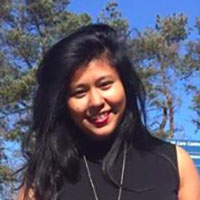
Fateha Hossain
Major: International Development Studies
Minors: Food Studies and History
What factors contributed to you choosing your program(s)?
When applying to UTSC, I entered into the International Development Studies (IDS) Co-op program, but by the end of my second year, I decided to complete a major in International Development Studies, and two minors in History and Food Studies. The IDS Co-op program provides an amazing opportunity for students to apply their knowledge in the field during their co-op placement. However, in my second year, I worked on a research project called Scarborough A Little Taste (SALT), which is an online website that highlights prominent cuisines in Scarborough, and through taking food studies courses at UTSC, my research interests grew into understanding the intersection between local development and the role that food played in addressing those issues. As such, I found that the combination of studies that I am currently pursuing allows me to cultivate my research interests, craft a set of useful skills, and provide a more robust foundation to understand the world around me.
Can you describe your program(s)? What is it actually like?
I would say that my programs complement each other quite nicely, so when trying to understand certain concepts or write essays about particular subjects, I find the things I learn in my other courses help to enhance my learning. Like many other humanities or social sciences programs, there is a lot of writing, but the help that I’ve received in trying to make sense of what I’m trying to research or understand is useful and appreciated. I find that my History minor teaches me the importance of analyzing things with a historical perspective, and is my opportunity to explore courses outside of my core research interests. Another aspect that I truly enjoy is the opportunity to engage fellow students in discussions about topics that I learned in other courses in order to understand their perspectives. The connections I am able to develop with friends and professors make what I’m learning more enjoyable and accessible, and partaking in various research work-study projects also helps to enhance my learning.
What tips/advice can you provide to students just starting or considering this program(s)?
- Try to attend some of the events being organized by the department(s) and its student associations/clubs.
- Get to know your professors and teaching assistants, and maintain that relationship, even after you’re finished the course.
- Ask about research or work opportunities from professors and teaching assistants, or look on CLN (cln.utoronto.ca) to see if there are any postings that relate to your program/research interests, and then apply for them!
What will you do with your degree after graduation?
To be quite honest, I don't have anything planned very specifically, but some of the directions I'd like to pursue are in food policy, further research, and community development. I believe that by taking the opportunities that are presented to me that I feel passionate about; I will be able to remain flexible and open in my endeavours.
What has your academic journey during your time been like as you progress toward graduation?
In first year, I took on a full course load along with a work study position and another part time job, and because of certain family situations going on at home, my struggles had more to do with my emotional well-being. Though my grades were not as satisfactory as I would have hoped, making that adjustment from high school to university encompassed more than just being a good student. It showed me the importance of prioritizing my well-being, general time management skills, and that ultimately, grades do not determine my self-worth. In second year, I incorporated more history and food studies courses into my studies such as HISB14 - Edible History: History of Global Foodways and WSTC24 - Gender in the Kitchen, which I found helped me to navigate my research interests. However, because of a very intensive workload, in the second semester of my second year, I took a part time course load which I found to be much more helpful. Taking that slight break helped me to refocus and reflect, and again, prioritize my well-being. Now having completed the first semester of my third year with a full course load, I took a research and writing course called Critical Writing and Research for Historians (HISB03) that helped to identify areas of strength and improvement in my research skill set. The course called the International Development of Food (IDSC14) also helped to bridge International Development Studies and Food Studies by illuminating the connections, issues, and theorists whose work ties those two fields together. Looking forward, I hope to continue practicing emotional resilience and developing my time-management and other skills, while finishing my studies.
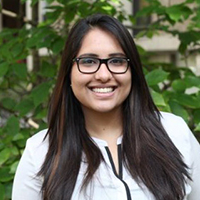
Maham Aqil
Major: International Development Studies
Minors: Anthropology and Political Science
What factors contributed to you choosing your program(s)?
I took world issues in high school and I fell in love with the subject.
Can you describe your program(s)? What is it actually like?
International Development is a program that takes a critical approach to development. You get to take core International Development courses and choose courses from other programs such as Health Studies, Anthropology, Politics, Economics etc. Thus, this program has a very diverse aspect to it. One can choose to approach development through many different lenses.
What tips/advice can you provide to students just starting or considering this program(s)?
- Don't panic when assignments start to pile up, make a timetable and stick to it!
- Be proactive
- Get involved! The IDS community is very welcoming and supportive getting involved helps you be part of a huge IDS family.
What will you do with your degree after graduation?
Law School
What has your academic journey during your time been like as you progress toward graduation?
First year was a lot of fun and full of surprises, I learned how to study, time manage and made a lot of friends. Second year really enhanced my knowledge of development studies, most International Development Studies core courses are offered in second year. Third year, I went on my Coop term. Fourth year, I got involved in a lot of groups on campus such as Political Science Student Association and International Development Conference. Fifth year, I became the president of International Development Student Association.
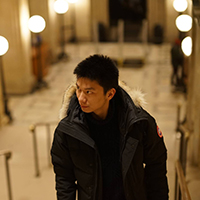
Ronghao Qu
Majors: International Development Studies and Psychology
What factors contributed to you choosing your program(s)?
I was always interested in international relations ever since I came to Canada as a child. The cultural differences and international dynamics between countries highly influenced the way that people perceived me as well as the way I perceived the world. This fact was especially true for me as an international student in university. Additionally, what also stood out to me was its focus on multinational issues and solving them in a diplomatic way.
Psychology became my second major afterwards, which was a decision I made when I was half way into my academic journey at UTSC. I wanted to study psychology because it was one of the fundamental studies of how the human mind works and helped me understand why people act the way they do. IDS and Psychology helped me better understand the mentality of the people I meet when I converse with them.
Can you describe your program(s)? What is it actually like?
IDS had helped me to understand about foreign and domestic politics, political problems in third world countries, as well as how the different cultural dynamics influence various circumstances. IDS showed me how to critically think about the world around me and spurred my curiosity. Psychology, on the other hand, helped me more on a personal level, allowing me to understand how different people operate differently due to their personality, their upbringing, and the environment that pressures them.
What tips/advice can you provide to students just starting or considering this program(s)?
I advise students to follow their instincts when choosing their program in general. There is nothing worse than feeling like you are stuck in a program you do not love. University is a journey of learning whose goal is not to achieve a certain grade but to genuinely chase a passion and go above and beyond to understand its concepts. This was why I personally choose to go abroad to multiple countries as a part of my program. I wanted to see how the concepts can be applied in real life, especially in the countries that I’ve learned about. I hope that future students can have the same passion to learn about the various issues affecting each country so that their energy can fuel them to make the most of their time in the IDS program.
What will you do with your degree after graduation? (Future plans?)
After graduation, there are two plans I plan to follow. My first plan is to apply for a master’s program at the either in the United Kingdom or the Kingdom of Sweden. I want to take my understanding of the international relations, and global security to the next level by pursuing higher education in this area. The other possible plan is entrepreneurship. I hope to start my own philanthropy to help improve the living conditions of those living in third world countries and make a difference.
What has your academic journey during your time been like as you progress toward graduation?
My academic journey has been quite the roller coaster. From the very beginning I had hope to go abroad and learn what I can do to make a difference, and for that, I am glad to say that I am beyond satisfied with what UTSC has offered me. Not only did I get to visit several countries, I also got to better understand myself as a person. I learned how to be independent, humble, and most importantly, motivated me to seek more knowledge.
Yixin Ren
Specialist: International Development Studies (science)
What factors contributed to you choosing your program(s)?
The passion of environmental management and policy making.
Can you describe your program(s)? What is it actually like?
It will be better if you take it with another area of studies. It could be politics, it could be sociology or environmental science since you will have access to having a bigger picture about how IDS works both in a global and local scale. Additionally, it will be helpful for your future career.
What tips/advice can you provide to students just starting or considering this program(s)?
For IDS courses: buy the textbook and do the readings as much as possible.
For EES courses: you do not necessary need the textbook, if you can fully memorize the slides; it is perfectly fine (Only for A-level Bio). For other courses that need scientific calculations, it will be great for you to do a lot of practice.
What will you do with your degree after graduation? (Future plans?)
Get a job and apply for a masters .
program.
What has your academic journey during your time been like as you progress toward graduation?
The first year is very hard especially since IDS knowledge is completely new for year 1 students. Second year needs a lot of reading to build your own position in this discourse. Third year is all about integration and creative minds. Fourth year purely depends on your position and you need to do research that support your statement.